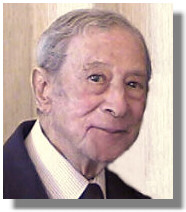

Max E. Solomon
at the Broadcast Pioneers Luncheon
Wednesday, June 18, 2003
![]()
Chairman of the Broadcast Pioneers Board, Pat Delsi said, "Max E. Solomon was truly legendary. He was one of the greatest radio time sales people ever to be in broadcasting. When you look up the word salesman in the dictionary, Maxie's picture is next to it."
Broadcast Pioneers member Max E. Solomon passed away at the age of 97 on Thursday afternoon, February 19, 2004. Born on Wednesday, March 28, 1906 in South Philly, he was a graduate of South Philadelphia High School. Maxie retired from the WFIL stations in 1970 and for awhile moved to Florida and lived next to the beach. However, in 2002, he returned to Philly to be close to family and friends. Max and his wife, Matilda were married for 78 years (their anniversary was a week before his death) and Max said that the couple's net worth when they married was $23.
When Max was 12 years old, he got a job as an office boy working for Philadelphia Mayor Thomas B. Smith. This was at a time, of course, when children were allowed to work at such a tender age.
When Max decided to retire, he wasn't quite old enough for retirement so the station paid him full salary for three years (but didn't require him to work) in order for him to be able to collect a pension. (Something like that would never happen today!) After retirement, Max E. Solomon became a consultant for several broadcast outlets, mainly teaching them how to sell commercial time.
Max sold spots (commercials) on radio (and TV). However, he started doing this in 1929 for Ike and Leon Levy at WCAU (when they were at 1321 Arch Street in Center City) after a short stint as a piano salesman. This was at a time when many people didn't even know what a commercial was.
Maxie once said that at WCAU in the twenties, he sold 60 second spots for $5 a piece. If you bought 10, you could have them all for a total of $25. Solomon said that in that era, a time salesman didn't have an office. You got one desk drawer in the secretary's area. He stated that after you worked there for a few months, they would even "let you use the telephone." And he got the job because he sold Victor Moore, Manager of a retail radio receiver outlet owned by WCAU, some custom made undershorts. Moore was so impressed with Maxie who actually delivered the shorts in person that he offered him a job with WCAU. Moore asked Solomon, "How much do you make selling men's furnishings," and Max said, $75 a week. Moore said, "We'll do better than that." In reality, Max only made $30 a week selling clothing.
Max E. Solomon said that for the longest time, The Levys didn't understand that the profit was in owning the radio station and selling commercials. They thought the cash was in selling radio sets. The station was just a necessary "evil" to sell radios.
Then Max went to WIP, owned by Gimbels. The station was located in the rug department. It was there that Max met Billy Banks who would later own WHAT and WWDB. After awhile, Billy and Max had an argument and Solomon punched Banks in the nose. WIP fired both of them and Max E. Solomon landed at WFI Radio, owned by Strawbridge and Clothier. WFI later merged with WLIT to become WFIL. In the forties, Walter Annenberg, publisher of the Philadelphia Inquirer purchased WFIL. Annenberg later said that not only was Max the top salesman at the station, not only the top salesman in the city, HE WAS THE TOP SALESMAN IN THE UNITED STATES!
Max E. Solomon was a founding member of our organization (started in 1962) and was leader of our group (our 7th President) in 1968 and 1969. He was named "Person of the Year" by the Broadcast Pioneers of Philadelphia in 1970 and was inducted into our HALL OF FAME in 1992.
Here's a classic Max Solomon story that is known nationally across our country: It was 1951, during the peak of Milton Berle's fame and Max walked into a car dealership (Sunny Stein) to try to sell the owner some commercials. The owner told Max, "Don't even talk to me. The only commercial I'll buy is just before Milton Berle starts his show." Solomon told him "No problem." The owner said, "I bet there is a waiting list." Max said no and that the owner could start advertising the next Tuesday (Berle was on Tuesdays at 8 pm). The contracts were signed and Tuesday came and went. On Wednesday, the owner called Max E. Solomon and said that his commercial didn't run. Max said, "Sure, it did." The owner said that he watched Channel 3 from 7:45 pm (15 minutes before Berle came on the air) until after the show ended and didn't see his spot. Max replied, "Oh, you didn't say you wanted it to run on the same station that carried Berle." (The spot ran just before Berle's show started but on a different station, Channel 6. The advertiser wasn't charged for the air time.)
By the way, Max's grandson, Broadcast Pioneers member Roger Krone has followed in Solomon's footsteps. Roger is an Account Executive for Power 99 (Clear Channel) here in Philadelphia.
Max E. Solomon is survived by his wife, 3 children, 7 grandchildren and 8 great-grandchildren.
![]()
From the official archives of the Broadcast Pioneers of Philadelphia
Researched and written by Broadcast Pioneers member Gerry Wilkinson
© 2004, All Rights Reserved
The e-mail address of the Broadcast Pioneers of Philadelphia is pioneers@broadcastpioneers.com